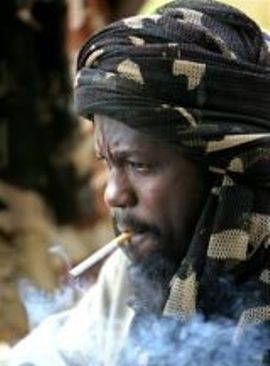Darfur former rebels reject anticipated integration in Sudan’s army
By Wasil Ali
Jan 11, 2007 (KHARTOUM) — A former Darfur rebel faction which signed a peace deal with Khartoum on May 2006 has rejected a plan proposed by the Sudanese government for early integration of its troops.
 The Commander in Chief of the SLA-Minawi, Juma Hagar, rejected a plan initially agreed by his group to integrate his forces into the Sudanese army immediately before the implementation of other clauses stipulated in the Darfur Peace Agreement.
The Commander in Chief of the SLA-Minawi, Juma Hagar, rejected a plan initially agreed by his group to integrate his forces into the Sudanese army immediately before the implementation of other clauses stipulated in the Darfur Peace Agreement.
In a press release, Hagar urged the Sudanese government to fulfill the four conditions set forth before proceeding with the integration. Hagar said that Khartoum has to provide non-military logistical support, disarm the Janjaweed militias, and supply the tools needed for the implementation of the DPA related to reintegrating combatants into civil society, and to create a favourable environment for return of the displaced persons and refugees to their areas.
Khartoum had proposed during last December the integration of the former rebel forces into the regular army prior to the implementation of the security arrangements in the DPA, particularly the disarmament of Janjweed militias.
Earlier this month Khartoum abruptly postponed the first phase of the forces integration of all the signatories to DPA. According to Sudanese daily al-Sahafa, the former rebels delayed the integration because they demand logistical support and disarmament of the Khartoum backed militia.
But the adjournment of the precocious integration has drawn an exchange of bitter accusations between the government and Minawi group.
The former rebel faction lashed at the government accusing it of deliberately withholding the funds needed to complete the integration process. However, the Sudanese presidential advisor, Majzoub al-khalifa, told Al-Sahafa that the government has fulfilled all its obligations under the Abuja accord and revealed that Minawi’s field commanders received seven billion Sudanese pounds (300.000 US dollar) along with tons of miscellaneous supplies. He added that those commanders have acknowledged the receipt of this package without elaborating.
Khalifa said that the lack of logistical support is not a valid excuse for postponing the integration. He disclosed that this support was supposed to come from the international community that, according to Khalifa, wanted to abort the Abuja accord and pave the way for the deployment of UN peacekeepers. Despite this, Khalifa pointed out that his government has furnished the logistics in recognition of its responsibility for security in Darfur.
Hagar statement which incorporates further demands comes as harsh response to the presidential advisor statement. The former rebel commander threatens to stop the peace process if Khartoum did not fulfill the above-mentioned demands. He further accused Khartoum of profiting from the lack of experience of the SLM political leadership and aborting the DPA implementation.
The head of the security commission arrangement on the Minawi side, Ali Traio, was skeptical of the of Khalifa’s statements regarding the funds received by the SLA, branding it as false, and an attempt to escape the reality and an evidence of the lack of seriousness in dealing with the committees.
Traio called on the government side to produce the receipts and the signatures that Khalifa referred to in his statements”. Traio went on further to say that “if there is someone else outside the government committee then we will have to know so we can deal with him “I think that Khalifa does not even recognize the security arrangements committee and very often overlooks it” and that his “constant interference the last few meetings of the committee is another example of that” Traio told al-Sahafa.
According to the DPA, Khartoum had to disarm the Janjaweed militia by the end of 15 October 2006. Sudanese government has done the inverse. The African Union peacekeeping mission, in a recent report produced in a ceasefire commission meeting in December, said that Sudanese government has supplied and rearmed the militias. Observers consider the DPA is not going into effect because Khartoum is awaiting the joining of the holdout rebels.
Khartoum also, publicly said that militias could not be disarmed as long as other rebel factions continue to attack the government positions in the troubled region of Darfur.. The first phase in the integration of the former rebel troops meant to put an end of the growing frustration among Minawi ranks and to stop their defection to the holdout factions.
(ST)
